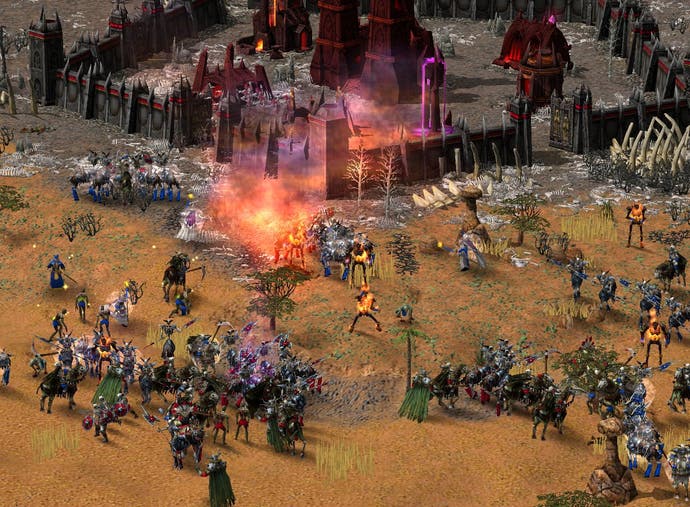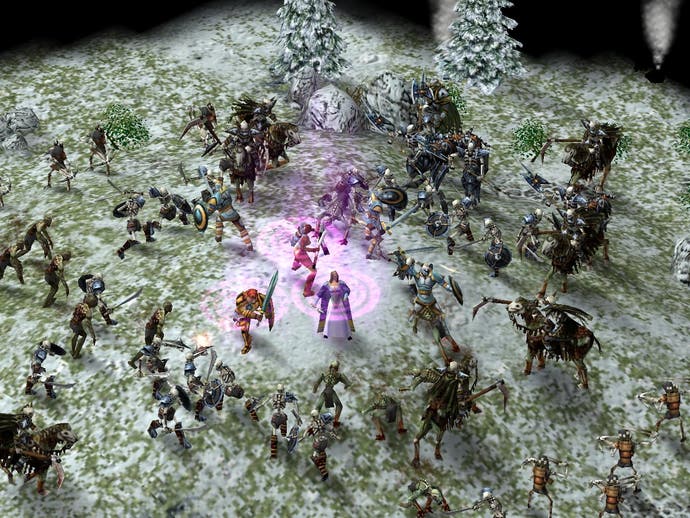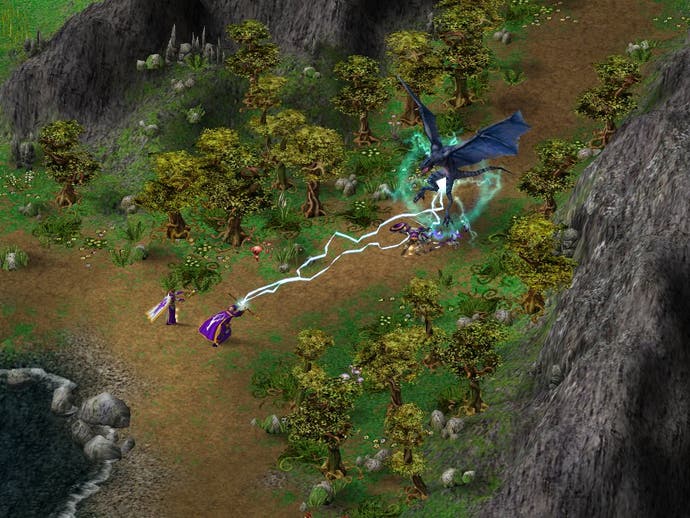Kohan II: Kings of War
War. It's fantastic.

Now here's an interesting example of the cross-Atlantic divide. When bobbing merrily along as a digital castaway on the gaming info-Sargasso it's possible to forget that flesh-space concerns as "nationality" still exist, but it doesn't make them any less real. So while Kohan II's imminent arrival has been causing outbreaks of disco-boogie in the colonies, in the heart of Empire we're very much still much playing wall-flower at this fantasy RTS party. It's no great change - in its previous iterations Kohan received strategy game of the year awards a plenty over there while over here it got... well... got forgotten.
It's not really fair. If you can see past the PC-standard meaningless subtitle and extraneous punctuation, Kohan II: Kings of War is a real-time strategy player's real-time strategy game. It has a sense of intricate design that places it in the gaming school that stretches back to where Civ was first injected into the genre in Age of Empires - that is, showing the maths behind the conflict very clearly, which tends to make the better players the sort of people who can resolve an equation most efficiently. And it's not even as if it doesn't innovate - Kohan II's designers have approached the problems the RTS faces and methodically worked out elegant, and mostly successful, solutions.
But still, as much as it's a serious and worthwhile game, Kohan II lacks. Having played it considerably before Rome and Dawn of War, I return to find myself relatively underwhelmed and fully aware that I'm unlikely to tarry in its pseudo-Tolkeinesque realm once I've finished this review, preferring to scuttle back to either the epic grandeur of grinding mother-Rome beneath my sandal or the dumb-kicks of raising a Bloodthirster and looking for trouble on the wrong side of the streets in a gothic far future.
Kohan II, positioned somewhere on the axis between Warcraft and Age of Empires, is most interesting when it tries to push the RTS away from rewarding over-defensive hedgehog-style players, while simultaneously slapping the wrists of those who go for the simple rush, stopping off along the way to create a greater sense of order to the scrum-like RTS play field.

It does this by setting in action a far more stringent unit-limit than the majority of RTS, with units of troops rather than individuals being recruited, and the unit-limit only inching upwards by expanding your cities and - more noticeably - creating new settlements. Maps are dotted with places to make new ones, encouraging you to head out and claim them, with further expansionist urges excited by its detailed economy which demands a level of resources (A shortfall of one is made up automatically in Gold. Since the shiny yellow metal is the master one in the system, using it up unnecessarily hugely impacts on the player's power).
However, this also curtails against rush-play by any settlement having a zone of aid to friendly troops around them and built-in militia to act as a basic defence. The former has the greatest impact. As long as they're in the vicinity, any unit of troops will have their injured healed and the empty spots in their ranks replenished. This gives a real edge to defenders and simultaneously, especially with an experience system on troops, encourages a defender to retreat and heal up rather than press on to the point of annihilation.
It's less successful in stopping the formation of giant rucks. While recruited in units, you're able to dictate each group's composition in detail, selecting the main body, the side-ranks and the support troops. So, for example, you could have a unit with spearmen in front, archers behind and a couple of healers at the back. And, abstractly, all try and work in support of one another. In practice, they do try and work in support of one another, but are mostly overwhelmed by the circumstances they find themselves. Not a complete success, but certainly better than most of its peers.
And if you're the sort of player who was disappointed with the solo-player of Dawn of War, you'll be more than satisfied here. The twenty-five mission central campaign is a suitably epic undertaking. The skirmish game highly developed, including random maps, with six races - and multiple factions of each giving individual bonuses - to master and experiment with. There really does everything you could ask an RTS to do.

So why no excitement?
Well... because there is no excitement. Or rather, not enough excitement. It lacks, to use an inappropriate word to wind up the purists, sex. It's paced considerably slower than most RTS games - certainly those of you coming straight from Dawn of War will feel as if your feet are dragging until your brain reacclimatises - and while this gives more space to perform the relatively complicated decisions the economy demands, it does mean that things can be over-leisurely. Alternatively, if you don't notice something is going wrong, then it's entirely possible you won't be able to make a difference by the time you do due to the dawdling nature of your troops.
Also, with the impressive AI not doing anything stupid (a good thing, clearly), and tactical encounters that leave room for retreat and healing, it's possible to fall into near-stalemates which take seemingly forever to resolve. It's not a game that lends itself to a quick play, certainly. And - reviewer's personal tilt time - it's a game that seems to lack the capacity for swift genius. None of Rome's artfully timed cavalry charge to turn the day or a clever repositioning of Assault troops in Dawn of War to turn the day - by the time you've decided to go to war, the victor is mostly decided. It's less war seen through the eyes of a general, and more through the quartermaster's.
"Solid" is one of those terrible damning-with-faint-praise words which will have anyone cringing but it's the one that applies. It's a well-built, well-made, well-designed well-solid RTS, and of its type, one of the finest of the year [Waitasec - "Well-solid" -Ed].
But if you're looking for glamour, you're in the wrong place.

